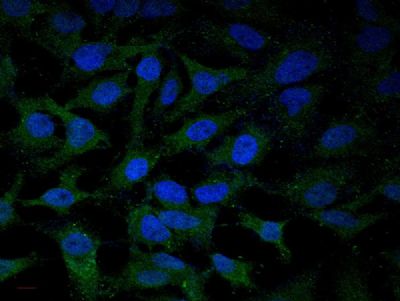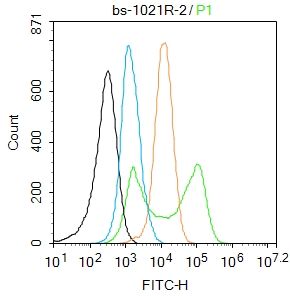Toll样受体4抗体
产品名称: Toll样受体4抗体
英文名称: TLR4
产品编号: 1021
产品价格: null
产品产地: 上海
品牌商标: 雅吉
更新时间: null
使用范围: ELISA IHC-P IHC-F Flow-Cyt ICC IF
上海雅吉生物科技有限公司
- 联系人 :
- 地址 : 上海市闵行区元江路5500号第1幢5658室
- 邮编 :
- 所在区域 : 上海
- 电话 : 158****3937 点击查看
- 传真 : 点击查看
- 邮箱 : yajikit@163.com
| 中文名称 | Toll样受体4抗体 |
| 别 名 | TLR4; TLR-4; TLR 4; ARMD10; CD 284; CD284; CD284 antigen; Homolog of Drosophila toll; hTol; Toll (Drosophila) homolog; TOLL; Toll Endotoxin Hyporesponsiveness; Toll like receptor 4; Toll like receptor 4 precursor; TLR4_HUMAN. |
| 研究领域 | 心血管 免疫学 信号转导 细胞膜受体 |
| 抗体来源 | Rabbit |
| 克隆类型 | Polyclonal |
| 交叉反应 | Human, Rat, Cow, (predicted: Mouse, Dog, Pig, Sheep, ) |
| 产品应用 | ELISA=1:500-1000 IHC-P=1:100-500 IHC-F=1:100-500 Flow-Cyt=2ug/Test ICC=1:100 IF=1:100-500 (石蜡切片需做抗原修复) not yet tested in other applications. optimal dilutions/concentrations should be determined by the end user. |
| 分 子 量 | 90kDa |
| 细胞定位 | 细胞浆 细胞膜 |
| 性 状 | Liquid |
| 浓 度 | 1mg/ml |
| 免 疫 原 | KLH conjugated synthetic peptide derived from rat TLR4:751-835/835 |
| 亚 型 | IgG |
| 纯化方法 | affinity purified by Protein A |
| 储 存 液 | 0.01M TBS(pH7.4) with 1% BSA, 0.03% Proclin300 and 50% Glycerol. |
| 保存条件 | Shipped at 4℃. Store at -20 °C for one year. Avoid repeated freeze/thaw cycles. |
| PubMed | PubMed |
| 产品介绍 | The Toll-like receptor 4 by activating natural immunity, specific immune response involved in the start-up, Toll-like receptor 4 as an important signal transduction transmembrane receptor involved in the toxin-induced inflammation in the pathological process, its mechanisms of control On a growing concern. all regions were either double-stranded or sequenced with an alternatechemistry or covered by high quality data(i.e., phred quality >=30); an attempt was made to resolve all sequencing problems, such as compressions and repeats; all regions were covered by at least one subclone; and the assembly was confirmed by restriction digest, except on the rare occasion of the clone being a YAC. The following abbreviations are used to associate primary accession numbers given in the feature table with their source databases: Em:, EMBL; Sw:, SWISSPROT; Tr:, TREMBL; Wp:, WORMPEP; Information on the WORMPEP database can be found at. TLR-4 plays an important role in microvascular leakage and leukocyte adhesion under the inflammatory condition associated with nonseptic thermal injury. Function: Cooperates with LY96 and CD14 to mediate the innate immune response to bacterial lipopolysaccharide (LPS). Acts via MYD88, TIRAP and TRAF6, leading to NF-kappa-B activation, cytokine secretion and the inflammatory response. Also involved in LPS-independent inflammatory responses triggered by Ni(2+). These responses require non-conserved histidines and are, therefore, species-specific. Subcellular Location: Membrane; Single-pass type I membrane protein. Tissue Specificity: Highly expressed in placenta, spleen and peripheral blood leukocytes. Detected in monocytes, macrophages, dendritic cells and several types of T-cells. Post-translational modifications: N-glycosylated. Glycosylation of Asn-526 and Asn-575 seems to be necessary for the expression of TLR4 on the cell surface and the LPS-response. Likewise, mutants lacking two or more of the other N-glycosylation sites were deficient in interaction with LPS. DISEASE: Genetic variation in TLR4 is associated with age-related macular degeneration type 10 (ARMD10) [MIM:611488]. ARMD is a multifactorial eye disease and the most common cause of irreversible vision loss in the developed world. In most patients, the disease is manifest as ophthalmoscopically visible yellowish accumulations of protein and lipid that lie beneath the retinal pigment epithelium and within an elastin-containing structure known as Bruch membrane. Similarity: Belongs to the Toll-like receptor family. Contains 18 LRR (leucine-rich) repeats. Contains 1 LRRCT domain. Contains 1 TIR domain. SWISS: Q9QUK6 Gene ID: 7099 Database links: Entrez Gene: 7099 Human Entrez Gene: 21898 Mouse Entrez Gene: 29260 Rat SwissProt: O00206 Human SwissProt: Q9QUK6 Mouse SwissProt: Q9QX05 Rat Unigene: 174312 Human Unigene: 38049 Mouse Important Note: This product as supplied is intended for research use only, not for use in human, therapeutic or diagnostic applications. Toll样受体4(TLR4)通过激活天然免疫,参与特异性免疫应答的启动, Toll样受体4(TLR4)作为一种重要跨膜信号转导受体参与了内毒素诱发炎症反应的病理过程,对其调控机制的研究日益受到关注. |
| 产品图片 | Tissue/cell: rat heart tissue; 4% Paraformaldehyde-fixed and paraffin-embedded; Antigen retrieval: citrate buffer ( 0.01M, pH 6.0 ), Boiling bathing for 15min; Block endogenous peroxidase by 3% Hydrogen peroxide for 30min; Blocking buffer (normal goat serum,C-0005) at 37℃ for 20 min; Incubation: Anti-TLR4/CD284 Polyclonal Antibody, Unconjugated(bs-1021R) 1:200, overnight at 4°C, followed by conjugation to the secondary antibody(SP-0023) and DAB(C-0010) staining  Tissue/cell:U2OS cell; 4% Paraformaldehyde-fixed; Triton X-100 at room temperature for 20 min; Blocking buffer (normal goat serum, C-0005) at 37°C for 20 min; Antibody incubation with (TLR4) polyclonal Antibody, Unconjugated (bs-1021R) 1:100, 90 minutes at 37°C; followed by a FITC conjugated Goat Anti-Rabbit IgG antibody at 37°C for 90 minutes, DAPI (blue, C02-04002) was used to stain the cell nuclei. Tissue/cell:U2OS cell; 4% Paraformaldehyde-fixed; Triton X-100 at room temperature for 20 min; Blocking buffer (normal goat serum, C-0005) at 37°C for 20 min; Antibody incubation with (TLR4) polyclonal Antibody, Unconjugated (bs-1021R) 1:100, 90 minutes at 37°C; followed by a FITC conjugated Goat Anti-Rabbit IgG antibody at 37°C for 90 minutes, DAPI (blue, C02-04002) was used to stain the cell nuclei. Image submitted by One World Lab validation program. HL60 and MCF-7 cells were stained with rabbit polyclonal antibody against TLR4 with two dilutions (1:100 and 1:250). 2nd antibody without primary antibody was used as control included here. Image submitted by One World Lab validation program. HL60 and MCF-7 cells were stained with rabbit polyclonal antibody against TLR4 with two dilutions (1:100 and 1:250). 2nd antibody without primary antibody was used as control included here. Blank control: Raw264.7. Blank control: Raw264.7.Primary Antibody (green line): Rabbit Anti-TLR4 antibody (bs-1021R) Dilution: 2μg /10^6 cells; Isotype Control Antibody (orange line): Rabbit IgG . Secondary Antibody : Goat anti-rabbit IgG-AF488 Dilution: 1μg /test. Protocol The cells were fixed with 4% PFA (10min at room temperature)and then permeabilized with 0.1% PBST for 20 min at at room temperature. The cells were then incubated in 5%BSA to block non-specific protein-protein interactions for 30 min at room temperature .Cells stained with Primary Antibody for 30 min at room temperature.The secondary antibody used for 40 min at room temperature.Acquisition of 20,000 events was performed. |
